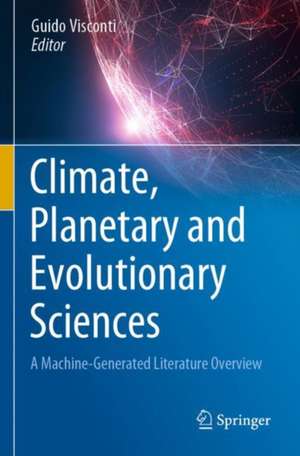Climate, Planetary and Evolutionary Sciences: A Machine-Generated Literature Overview
Editat de Guido Viscontien Limba Engleză Paperback – 16 apr 2022
It is important to us as a publisher to make the advances in technology easily accessible to our authors and find new ways of AI-based author services that allow human-machine interaction to generate readable, usable, collated, research content.
| Toate formatele și edițiile | Preț | Express |
|---|---|---|
| Paperback (1) | 771.87 lei 6-8 săpt. | |
| Springer International Publishing – 16 apr 2022 | 771.87 lei 6-8 săpt. | |
| Hardback (1) | 884.99 lei 6-8 săpt. | |
| Springer International Publishing – 15 apr 2021 | 884.99 lei 6-8 săpt. |
Preț: 771.87 lei
Preț vechi: 941.30 lei
-18% Nou
Puncte Express: 1158
Preț estimativ în valută:
147.76€ • 151.97$ • 122.59£
147.76€ • 151.97$ • 122.59£
Carte tipărită la comandă
Livrare economică 20 februarie-06 martie
Preluare comenzi: 021 569.72.76
Specificații
ISBN-13: 9783030747152
ISBN-10: 3030747158
Ilustrații: XIII, 364 p. 1 illus.
Dimensiuni: 155 x 235 mm
Greutate: 0.53 kg
Ediția:1st ed. 2021
Editura: Springer International Publishing
Colecția Springer
Locul publicării:Cham, Switzerland
ISBN-10: 3030747158
Ilustrații: XIII, 364 p. 1 illus.
Dimensiuni: 155 x 235 mm
Greutate: 0.53 kg
Ediția:1st ed. 2021
Editura: Springer International Publishing
Colecția Springer
Locul publicării:Cham, Switzerland
Cuprins
Foreword.- Preface.- Chapter 1: Evolution of the atmospheric composition.- Chapter 2: Downscaling and regional climate.- Chapter 3: Response Theory and Climate Change.- Chapter 4: Stochastic weather and climate models.- Chapter 5: Progress in climate modeling.- Chapter 6: Maximum entropy production and climate.- Chapter 7: Astrobiology and development of human civilization.- Chapter 8: Planets and Exoplanets, habitability sustainability and time.- Chapter 9: Geobiology.- Chapter 10: Fermi paradox.-Chapter 11: The Gaia hypothesis, evolution and ecology.
Notă biografică
Guido Visconti is Professor Emeritus at Università dell'Aquila, Italy and a member of the National Academy of Lincei. He has held a Fulbright Fellowship (1968-69), University of Maryland (USA). NATO Fellowship, Dept of Meteorology, MIT, USA, (1976, 1977). NATO Senior Fellowship, NCAR, USA (1986 -1987). He has served as committee member of the Intergovernmental Panel for Climatic Change (IPCC) and Member of the International Ozone Commission (WMO). In his long career he was the Principal Investigator UARS Correlative Measurements Program (NASA) and Atmospheric Effects of Supersonic Airplane (AESA, NASA). He was the author of the books, Fundamentals of Physics and Chemistry of the Atmosphere, Second Edition, (2016), Problems, Philosophy and Politics of Climate Science, (2018) and Fluid dynamics (2020).
Textul de pe ultima copertă
This book presents the result of an innovative challenge, to create a systematic literature overview driven by machine-generated content. Questions and related keywords were prepared for the machine to query, discover, collate and structure by Artificial Intelligence (AI) clustering. The AI-based approach seemed especially suitable to provide an innovative perspective as the topics are indeed both complex, interdisciplinary and multidisciplinary, for example, climate, planetary and evolution sciences. Springer Nature has published much on these topics in its journals over the years, so the challenge was for the machine to identify the most relevant content and present it in a structured way that the reader would find useful. The automatically generated literature summaries in this book are intended as a springboard to further discoverability. They are particularly useful to readers with limited time, looking to learn more about the subject quickly and especially if they are new to the topics. Springer Nature seeks to support anyone who needs a fast and effective start in their content discovery journey, from the undergraduate student exploring interdisciplinary content, to Master- or PhD-thesis developing research questions, to the practitioner seeking support materials, this book can serve as an inspiration, to name a few examples.
It is important to us as a publisher to make the advances in technology easily accessible to our authors and find new ways of AI-based author services that allow human-machine interaction to generate readable, usable, collated, research content.
It is important to us as a publisher to make the advances in technology easily accessible to our authors and find new ways of AI-based author services that allow human-machine interaction to generate readable, usable, collated, research content.
Caracteristici
A Machine-Generated Literature Overview of climate, planetary and evolutionary sciences An experimental text into machine generated and curated content A starting guide to Climate, Planetary and Evolutionary Sciences
